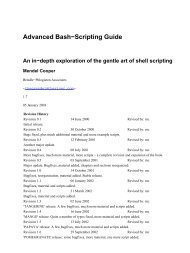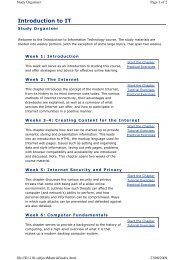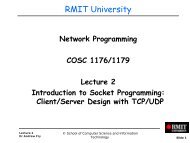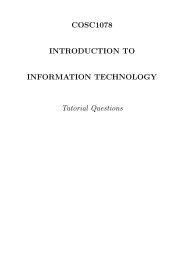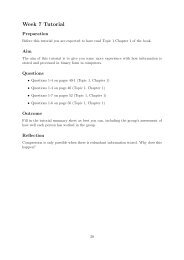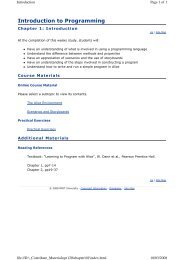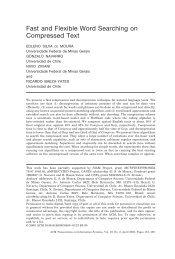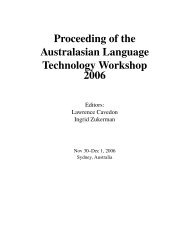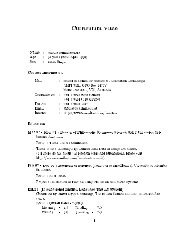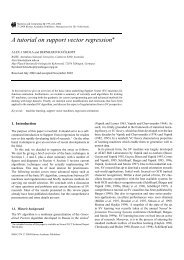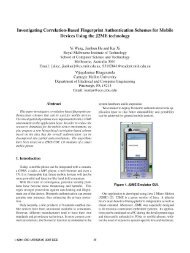The MBC information booklet - RMIT University
The MBC information booklet - RMIT University
The MBC information booklet - RMIT University
You also want an ePaper? Increase the reach of your titles
YUMPU automatically turns print PDFs into web optimized ePapers that Google loves.
Chapter 2: Masters Program Format and Timetables<br />
CHAPTER 2 Masters Program Format<br />
and Timetables<br />
2.1 Terminology and Definitions<br />
2.1.1 Specialist<br />
Cluster<br />
<strong>The</strong> program can be undertaken in two modes—full-time and part-time. Each course in the<br />
program is valued by a number of credit points. All non thesis/project courses are valued<br />
at 12 credit points. To complete the program each student must undertake 144 Credit<br />
Points and achieve a CGPA of at least 2.0. To undertake the thesis option, students<br />
must achieve a CGPA of at least 3.0.<br />
<strong>The</strong> normal duration of a full-time program is one and half years, and the normal duration<br />
of a part-time program is three years. Credit will not ordinarily be given for courses<br />
completed in a 3-year undergraduate program or as part of a Graduate Diploma (as<br />
distinct from a Postgraduate level Diploma or Postgraduate level Certificate).<br />
<strong>The</strong> program cannot be completed in 12 calendar months.<br />
Students need to complete:<br />
• 1 specialist cluster<br />
• 1 elective cluster<br />
Plus either:<br />
• 1 vocational cluster; OR<br />
• COSC2149 Research Methods and a Minor <strong>The</strong>sis/Project<br />
A specialist cluster is a group of four thematically-linked courses. Part-time students<br />
undertake two courses in each semester. Each course in the cluster is valued at 12 credit<br />
points. <strong>The</strong> themes or specialist course areas offered in the program are:<br />
• Advanced Databases (see page 17)<br />
• Bioinformatics (see page 21)<br />
• Computer Security (see page 25)<br />
• Intelligent Systems (see page 29)<br />
• Networked & Distributed Systems (see page 33)<br />
• Search Engines (see page 37)<br />
• Software Engineering (see page 39)<br />
• Web-based Computing (see page 43)<br />
Students must pass a minimum of four courses to complete a specialist cluster. <strong>The</strong><br />
specialist cluster is undertaken across the first two semesters in general.<br />
In some clusters, there may be more than four courses to choose from. Students still need<br />
to choose only four courses to obtain their specialisation, although they may do extras as<br />
part of their elective or vocational cluster. In general the courses offered will be as listed in<br />
this <strong>information</strong> <strong>booklet</strong>.<br />
<strong>The</strong> School reserves the right to rearrange course offerings based on student demand and<br />
lecturer availability.<br />
<strong>The</strong> specialist cluster chosen usually determines the area of a minor thesis (if the student<br />
is eligible and wishes to undertake the thesis).<br />
9



